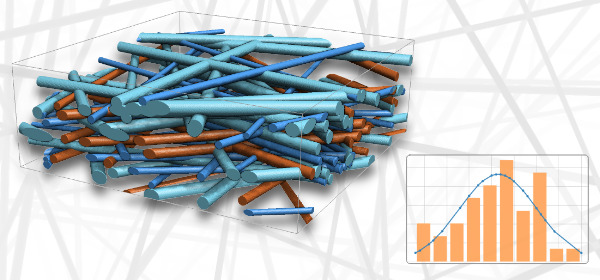Microstructure Analysis
I offer you all the possibilities of digital microstructure analysis. For this I use the scientific software package GeoDict. Depending on the material, different aspects of the microstructure may be of interest.
Analysis Options
Pore Analysis
- Porosity
- Pore Size Distribution
- Specific Surface Area
- Sphericity and orientation
Grain Analysis
- Grain size distribution
- Specific Surface Area
- Orientation and Shape of Grains
Fiber Analysis
- Orientation
- Fiber volume fraction
- Diameter distribution
- Length and fiber curvature
Advantages
Time
You save time because no time-consuming laboratory analysis has to be carried out.
Costs
Digital analysis is often cheaper than traditional laboratory analysis.
Possibilities
The geometric analysis offers completely new possibilities, which would not be feasible with conventional methods.
Procedure
For the digital measurement of the microstructure a 3-D image of your material sample – as so-called digital material sample – is necessary. There are several ways to obtain a digital material sample.
- Industrial computed tomography: The material sample is scanned using a microtomography scanner. From the obtained tomography, a three-dimensional image is derived.
- 2D image: In some cases, a two-dimensional image of your material is sufficient. This is an isolated case to consider. If there is a 2D image, for example from an optical microscope, a 3D image can be extrapolated for examination.
- Virtual material sample: Based on your information, a virtual material sample is generated. This sample can then be examined for the relevant properties. This method can be used for well-defined structures such as wire mesh.
